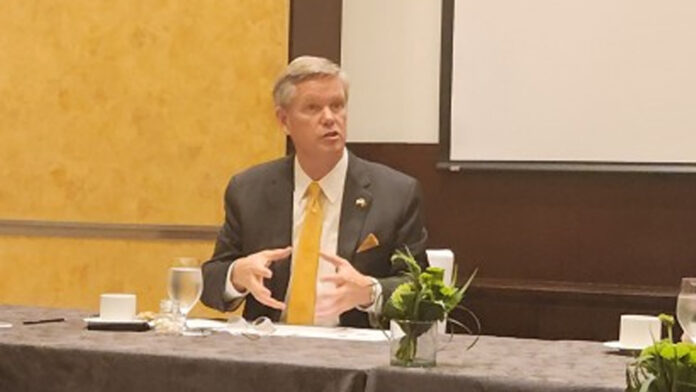A visiting official of the United States has assured the Philippines that the 123 Agreement, or the civil nuclear cooperation deal, could stand different administrations, especially with the US presidential elections in November.
US Nuclear Regulatory Commission chair Christopher Hanson said in a media roundtable in Makati City on Thursday that the US government remains firm on its commitment under the 123 Agreement even if there will be changes in their administration over the years.
Hanson said his office also prioritizes the Philippines in terms of giving assistance in developing the regulatory framework for the country’s nuclear energy sector.
As the US-Philippines Civil Nuclear Cooperation Agreement entered into force on July 2, the US official is in the Philippines for a two-day visit to meet with local authorities to discuss ways forward, particularly in drafting the regulatory framework for the use of nuclear technologies in the country.
Hanson already met with Department of Energy Secretary Raphael Lotilla and Undersecretary Sharon Garin, wherein discussions focused on the government’s ambitions and plans to develop nuclear power plants.
He also had a meeting with chairperson of the House of Representatives Special Committee on Nuclear Energy, Rep. Mark Cojuangco, who discussed the enabling legislation in developing the country’s nuclear sector.
Hanson is also set to visit the Makati Medical Center to see the medical uses of radioactive materials, especially in cancer care.
He will have a meeting at the Philippine Nuclear Research Institute on Friday.
“As long as I’m in this position, assistance to the Philippines will be a priority. I can tell you that civil nuclear cooperation agreements like 123 Agreements are designed to last across multiple administrations,” Hanson said.
“It’s my strong hope that if there’s a change in administration in the United States, our commitment will remain firm.”
Hanson said the US and the Philippine governments would conduct activities, such as workshops, to help the country develop its policies and regulations in the nuclear sector.
“We’re going to see an increase in the tempo of engagement from the US on the nuclear safety aspects. On the other side, I think you’re going to see a real uptick in the amount of commercial interest and companies coming to the Philippines and wanting to explore with the government, how they might deploy nuclear power. But I think we’ll see that perhaps later on,” he added. (PNA)






